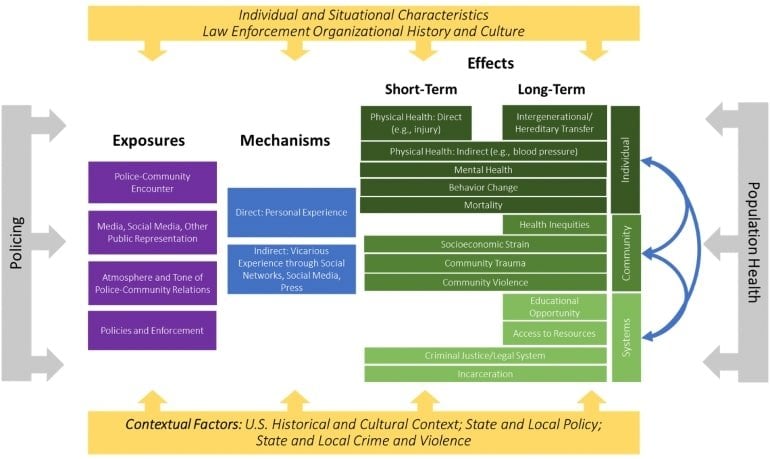Summary: A new model shows how different encounters with the police can affect population health at multiple levels.
Source: University of Washington
A specific police action, an arrest or a shooting, has an immediate and direct effect on the individuals involved, but how far and wide do the reverberations of that action spread through the community? What are the health consequences for a specific, though not necessarily geographically defined, population?
The authors of a new UW-led study looking into these questions write that because law enforcement directly interacts with a large number of people, “policing may be a conspicuous yet not-well understood driver of population health.”
Understanding how law enforcement impacts the mental, physical, social and structural health and wellbeing of a community is a complex challenge, involving many academic and research disciplines such as criminology, sociology, psychology, public health and research into social justice, the environment, economics and history.
“We needed a map for how to think about the complex issues at the intersection of policing and health,” said lead author Maayan Simckes, a recent doctoral graduate from UW’s Department of Epidemiology who worked on this study as part of her dissertation.
So, Simckes said, she set out to create a conceptual model depicting the complex relationship between policing and population health and assembled an interdisciplinary team of researchers to collaborate.
“This model shows how different types of encounters with policing can affect population health at multiple levels, through different pathways, and that factors like community characteristics and state and local policy can play a role,” said Simckes, who currently works for the Washington State Department of Health.
The study, published in early June in the journal Social Science & Medicine, walks through the various factors that may help explain the health impacts of policing by synthesizing the published research across several disciplines.
“This study provides a useful tool to researchers studying policing and population health across many different disciplines. It has the potential to help guide research on the critical topic of policing and health for many years to come,” said senior author Anjum Hajat, an associate professor in the UW Department of Epidemiology
For example, the study points out when considering individual-level effects that “after physical injury and death, mental health may be the issue most frequently discussed in the context of police-community interaction … One U.S. study found that among men, anxiety symptoms were significantly associated with frequency of police stops and perception of the intrusiveness of the encounter.”

Among the many other research examples explored in the new model, the researchers also examine the cyclic nature of policing and population health. They point out that police stops tend to cluster in disadvantaged communities and “saturating these communities with invasive tactics may lead to more concentrated crime.”
Consequently, it may be “impossible” to determine whether police practices caused a neighborhood to experience more crime or if those practices were in response to crime. However, the model’s aim is to capture these complex “bidirectional” relationships.
“Our model underscores the importance of reforming policing practices and policies to ensure they effectively promote population wellbeing at all levels,” said Simckes. “I hope this study ignites more dialogue and action around the roles and responsibilities of those in higher education and in clinical and public-health professions for advancing and promoting social justice and equity in our communities.”
Co-authors include Dale Willits, Department of Criminal Justice and Criminology, WSU; Michael McFarland, Department of Sociology, Florida State University; Cheryl McFarland, Central Jersey Family Health Consortium, New Jersey; Ali Rowhani-Rahbar, Department of Epidemiology and Harborview Injury Prevention and Research Center, UW.
About this psychology research news
Source: University of Washington
Contact: Jack Ellison – University of Washington
Image: The image is credited to University of Washington
Original Research: Closed access.
“The adverse effects of policing on population health: A conceptual model” by Maayan Simckes et al. Social Science and Medicine
Abstract
The adverse effects of policing on population health: A conceptual model
While negative encounters between police and the community are not a new trend, recent high profile deaths of unarmed people of color have gained widespread national attention and ignited new movements demanding reform, accountability, and progress. Increasingly over the past few decades, researchers have examined the most extreme cases of lethal use of force, describing the context of these violent encounters, situational and personal characteristics, and underlying risk factors. More recent research has aimed to define the broader and more nuanced adverse effects that policing can have on population health.
We propose a holistic and multidisciplinary model for the relationship between policing and population health in the U.S. that incorporates contextual, situational, and individual-level factors while also recognizing the direct and vicarious mechanisms by which policing exposures can negatively affect population health. The model captures the short and long term health effects of policing and the cyclic nature by which those effects at the individual, community, and systemic levels can influence each other.
We consider the unique qualities of different communities that may influence these pathways, the historical trends of the criminal justice and policing systems, and recommend applications of the model in policing agencies, medicine, and research.






